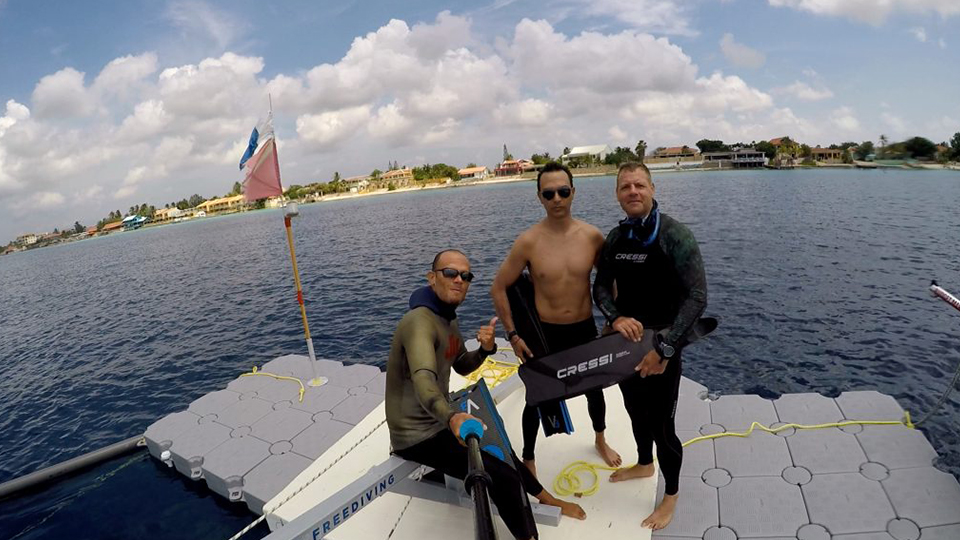Train like a Freediver for a Peak Performance in Endurence Sports- (a Triathlete’s Perspective)
“God is at the bottom of the ocean, and I dive to find him.”
ENZO MAIORCA
Hook the Breath, Relax”. The most pronounced words by a Freediver Instructor. Hook the Breath is a maneuver performed by a freediver at the surface after every dive. It consists of inhaling promptly and encapsulating the inhaled air. This technique helps to recover the oxygen consumed during the immersion. Relaxation is a fundamental condition to perform in a supreme way the sport of freediving. These two words have become a mandate for a lifestyle which centers the attention in breathing and relaxation.
Back in 2012, a friend of the Special Operations Forces family introduced me to the world of freediving. It seemed very interesting to me. This same year we started to train in the Colombian Caribbean sea. Carlos Correa, a pioneer of the sport in Colombia, and founder of @clubdelphinus was my instructor and taught me the first concepts of the art of breath holding. I developed a strong connection with this discipline from the very first moment, understanding the importance to adopt a permanent culture of good respiratory practices to achieve an improved respiration.
This is how I became aware of the importance of improving the quality of my breath. I incorporated as a daily routine in my life, a specific breathing training program with breath hold type of exercises; oriented to achieve an imporoved respiration. I am convinced this program has a positive effect in five essential aspects of ordinary life; leadership, mental focus, decision making, health and phisycal fitness. This publication will explain from the scientific stand point, the reason behind training like a freediver has a tremendous impact in endurance sports performance.
This respiration matter looks more like a “yogi” thing, not relevant to a military individual like myself, but I think breath control training could be included in different military instruction programs. In fact, one of the marksmanship principles is breathing control. However, there are no subject matter experts in this field of breathing.
A different approach is taken by one of the finest Special Operations forces in the world, the Navy SEALS, which has adopted breathing practices to automate a proactive reaction of its members to better perform in a VUCA (volatility, uncertainty, complexity, and ambiguity) environment, using situational awareness; skills developed through training such as Box Breathing.
In the pursuit of this interest of getting better control of the breathing, I found several specialized books that helped me to gain more knowledge about the health benefits for people who can achieve an improved respiration. Furthermore, I consulted experts in the subject of breathing. In 2017, in Bonaire, a Dutch island in the Caribbean, I asked Carlos Coste @deepseafreediving to support my preparation to become a freediver instructor. Carlos is one of the best freediver trainers in the world, and the first human to go below the 100 meters mark, diving only with his fins.
I spent one month studying the theory of freediving, learning several breathing exercises and doing different type of underwater breath holding maneuvers. I had the privilege to share classes with Theo Knevel @theoknevel, a former military member of the Royal Dutch Marines Special Boat Service. Carlos gave us high quality preparation to pass the demanding requirements, both physical and academic, in order to earn our PADI (Professional Association of Divers Instructors) freediver instructor certification.
Besides the proud feeling of being a freediver instructor, I ingrained the freediving culture. I reaffirmed my belief about the benefits of adopting a lifestyle which devotes sublime attention to improved respiration. To train and live as a freediver is among other things, to perfect relaxation, to master concentration; to prepare the body to perform at highly demanding levels in a different dimension.
Finally, from a more holistic perspective, speaking as a recreational triathlete, I think one of the greatest paybacks of attaining an improved respiration, while progressively training as a freediver, is the adaptation of the body to increase the tolerance of CO2 levels in the blood. This results in a higher maximal oxygen uptake, or VO2 max. (VO2 max refers to the maximum capacity of your body to transport and utilize oxygen in 1 minute during maximal or exhaustive exercise). In other words, the body is able to deliver oxygen more efficiently during high-intensity exercise, which means a better physical endurance.
Breathe to inspire***
Bibliography
- McKeown, Patrick. The Oxygen Advantage, the Simple, scientifically proven breathing techniques for a healthier, slimmer, faster and fitter you.
